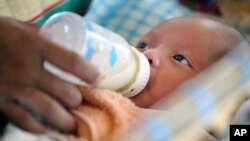The illegal promotion of breast milk substitutes in Phnom Penh is leading to negative health effects, according to a report by Hellen Keller International.
Labeling and point-of-sale restrictions are being ignored, the group said in its report Maternal and Child Nutrition.
It goes on to say that companies are in breach of Sub-Decree 133, which regulates the marketing of the products and requires Ministry of Health permission to promote the products at point-of-sale.
The report found that the use of substitutes was common among Phnom Penh mothers, and that those mothers were almost four times more likely to use substitutes if they had used them early on. Their use negatively impacts exclusive breastfeeding and can shorten the duration of breastfeeding, both of which can have wider nutrition and health effects in children and mothers, it said.
Hou Kroeun, Helen Keller International's deputy country director, said widespread marketing of the product had led to the erroneous belief that it was of a higher nutrition value than breast milk.
“If the milk powder producer makes an exaggerated advertisement, it leads to public confusion. The people will think that the milk powder is more nutritious than breast milk. This is what concerns us if the advertisement is not in accordance with Sub-Decree No.133.”
“Nowadays, Helen Keller International is working with civil society groups as well as the government in implementing Sub-Decree No. 133 in order to promote breastfeeding.”
The report says that the benefits of breastfeeding are many, including a reduced risk of obesity, asthma and chronic diseases.
“Another thing is that we help raise awareness of the Sub-Decree to the public via forum, and we also celebrate Breastfeeding Day,” Kroeun said.
Ly Sovann, a Ministry of Health spokesman, said the ministry would publish new guidance which would be sent to distributors.
“It’s concerned with the market when it comes to the case of illegal breast milk substitutes. This requires cooperation from the related institution. The Ministry has also appealed to institutions that deal with the market [of breast milk substitutes] to act according to the law.”
Sovann added that the Ministry of Health supports natural breastfeeding for children under six months old.







